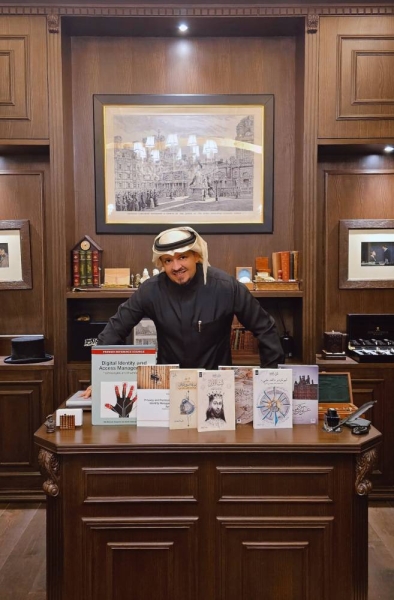At the fascinating crossroads of technology and imagination, Dr. Waleed Alrodhan Alshalan emerges as a prominent figure in Saudi Arabia’s academic and cultural landscape. A cybersecurity associate professor and passionate novelist, Alshalan blends technical expertise with literary finesse. His novel Leonardo da Vinci gained significant attention in the Saudi cultural scene in 2022, and now, he celebrates the release of his first English-translated work, Laith the First: The Unknown King of England.
In this exclusive interview, we delve into his unique journey, explore the intersection of cybersecurity and literature, and get a glimpse into his upcoming creative projects.
Q: Dr. Waleed, as a cybersecurity professional and academic, what inspired you to step into the world of literature and novel writing?
Since 2002, I’ve been actively engaged in the field of cybersecurity, both in industry and academia, a domain that continues to fuel my professional passion. Yet, from an early age, I developed a strong affinity for literature and history. My father, a well-known littérateur, encouraged me to embrace writing as a bold parallel path.
This literary pursuit turned out to be an enriching adventure that never conflicted with my academic career; in fact, it expanded my intellectual horizons. Interestingly, my background in cryptography and cybersecurity has also enriched my writing, which is quite apparent to the readers of my novels.
Q: How many books have you authored so far? And do you also write scientific literature alongside fiction?
I’ve authored four novels in Arabic: Bob Isn’t My Uncle; Laith the First: The Unknown King of England; Leonardo da Vinci; and 42: The Answer to the Ultimate Question of Life, the Universe, and Everything.
On the academic side, I published a book titled Privacy and Practicality of Identity Management Systems with VDM Verlag Dr. Müller in Germany. Additionally, I contributed two chapters to the well-regarded book Digital Identity and Access Management, published by Information Science Reference in the United States.
Q: Your novel Laith the First was recently released in English. What was your motivation behind this step, and what makes this novel unique?
I’ve long aspired to translate my Arabic works into other languages to reach a broader, more diverse audience. That aspiration materialized with the English release of Laith the First, masterfully translated by Ms. Rana Alden. Originally published in Arabic in 2017, the novel spans nearly a millennium, beginning with the reigns of Henry I and Henry II and ending in 2016.
It tells the fictional biography of an English king, Laith the First, who is imagined to have been born and buried in the ancient city of Dumat Aljandal in modern-day Saudi Arabia. The narrative weaves together history, action, romance, and layered themes of mathematics and cryptography — a reflection of my professional roots. More profoundly, the novel seeks to underscore the unity of human destiny and the interconnectivity of global histories. It also aims to introduce the rich heritage of Dumat Aljandal while engaging Arab readers with British history through an edutainment lens.
Q: What upcoming cultural projects are you currently working on?
I’m currently working on a new novel that marks a departure from my previous work. It demands extensive research and intricate plot development, making it a rewarding yet challenging endeavor.
Additionally, I’ve completed a bilingual (Arabic-English) screenplay adaptation of Leonardo da Vinci, and I’ve written the script for a documentary series exploring the mysteries of the Voynich manuscript — projects I hope will come to life soon.
On the educational front, I continue to deliver public lectures; my most recent one, titled Algorithmed Lives, was met with enthusiastic feedback. I plan to deliver more talks this year. I’ve also launched a brief edutainment video series called Minutes with Waleed, and I continue publishing episodes of my educational podcast, Information Security for Everyone – Prime, designed to make cybersecurity concepts more accessible to the public.
Q: Any final message you’d like to share with your readers?
I truly believe that a diversity of interests and interdisciplinary engagement are what enrich the human experience. Reading and writing are not merely hobbies, they are gateways to self-discovery and deeper understanding of others. My hope is that my work serves as a bridge, guiding readers toward new intellectual realms and inspiring a more expansive worldview.



